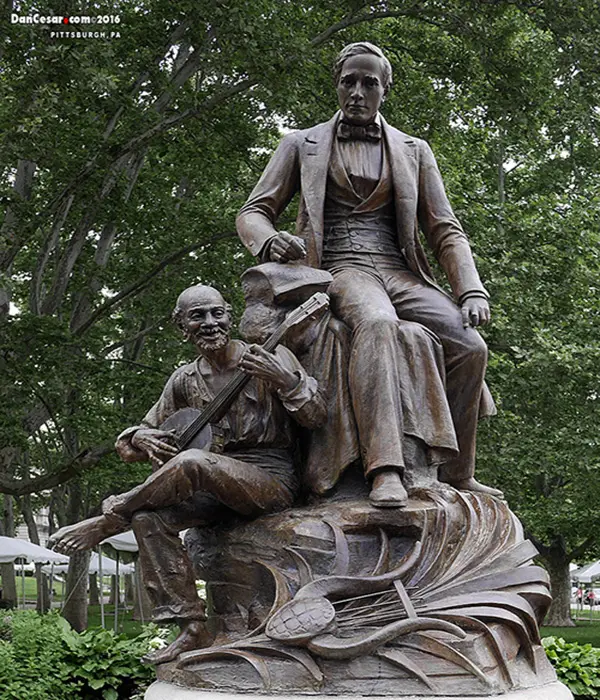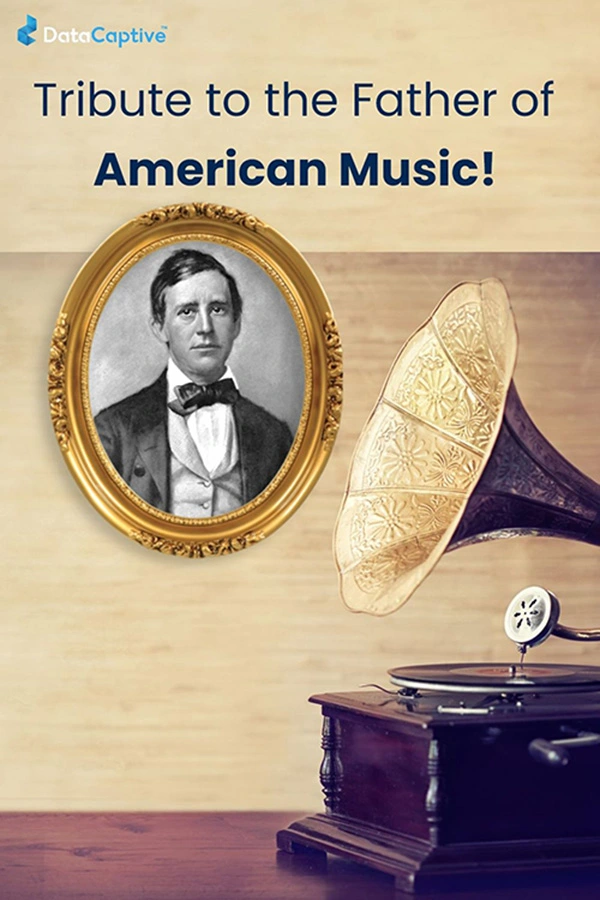Stephen Foster Memorial Day January 2024 in the United States
By KnowledgeVeto Thursday, January 11, 2024 15:40

© Images Provided By tc.pbs.org
On this Foster Memorial Day January 13
The Stephen Foster Culture Center State Park, located on the banks of the Suwannee River in Florida, celebrates Stephen Foster's memory. The center displays Foster's most famous song, and his music can be heard in the park during the day. Many of Foster's songs are also lasting testaments to his accomplishments.

Provided Image from live.staticflickr.com Painting of Foster at the National Mississippi River Museum & Aquarium
The songwriter is remembered with a plaque at the University of Pittsburgh in Pennsylvania, as well as a sculpture of Foster near the entrance to the Carnegie Museum of Natural History. Since 1958, a musical titled Stephen Foster - The Musical has been performed.
The US president may make an annual proclamation to commemorate Stephen Foster Memorial Day with appropriate ceremonies.
Pilgrimages to Stephen Foster shrines.
Musical performances featuring his compositions.
Events on the day may be planned at locations that honor Stephen Foster, such as the Stephen Foster Culture Center State Park in Florida. Some schools offer music and history classes centered on Stephen Foster's life and works around this period. Many music appreciation clubs and songwriter-related groups, such as the Stephen Foster Citizen Support Organization, pay honor to Stephen Foster.
About Stephen Collins Foster
Stephen Collins Foster (July 4, 1826–January 13, 1864), known as "the father of American music," was an American composer known mostly for his parlor and minstrel music during the Romantic period. He wrote almost 200 songs, including "Oh! Susanna", "Hard Times Come Again No More", "Camptown Races", "Old Folks at Home" ("Swanee River"), "My Old Kentucky Home", "Jeanie with the Light Brown Hair", "Old Black Joe", and "Beautiful Dreamer", and many of his compositions are still popular today.
Stephen Collins Foster, the ninth of William B. and Eliza T. Foster's ten children (plus a son fathered by William prior to the marriage and raised as their oldest child), was born on July 4, 1826, in a white cottage high on the hillside above the Allegheny River in Lawrenceville, east of Pittsburgh. The tenth child died as an infant, leaving Stephen as the family's "baby" to be cared for by older siblings and sisters.
Foster was born July 4, 1826, in Lawrenceville, Pennsylvania. His parents, William Barclay Foster and Eliza Clayland Tomlinson Foster, were of Ulster Scots and English heritage. He has three older sisters and six older brothers. He attended private academies in Allegheny, Athens, and Towanda, Pennsylvania, where he learned English grammar, diction, classics, penmanship, Latin, Greek, and mathematics. The family lived in a northern city and did not favor the abolition of slavery.
Struggling Life
At the age of 20, Stephen began working as a bookkeeper for his brother Dunning's shipping company in Cincinnati. He also sold some of his songs and piano pieces to a local music publisher, and his first great hit was "Oh! Susanna." Stephen, 24, returned to Pittsburgh in 1850, married 20-year-old Jane Denny MacDowell, and began his career as a professional songwriter, having already published 12 pieces. Their daughter Marion was born the next year. In 1852, the couple went on a delayed honeymoon, a month-long steamboat cruise to New Orleans with friends, which was Stephen's only trip to the deep South.
In 1853, he moved to New York to be closer to his publishers; Jane joined him in Hoboken, New Jersey, in 1854. They returned to Pittsburgh later that year, initially residing in the family home and then in a series of boarding homes until both of their parents died in 1855.
Stephen spent much of his youth in Pittsburgh, where he worked hard on his songwriting, keeping a large sketchbook to jot down ideas for song lyrics and melodies. As a professional songwriter of unrivaled talent and technique, rather than an untrained musical genius, he had made it his job to study the many music and poetry genres prevalent among the nascent United States' immigrant populations. His objective was to write people's music with pictures and a musical vocabulary that all groups could understand. Foster worked extremely hard at writing, sometimes spending months crafting and polishing the words, melody, and instrumentation of a song before delivering it to a publisher.
His sketchbook reveals that he frequently fussed over the slightest details, the proper prepositions, and even where to include or omit a comma from his songs.
His Downtime
Foster's "Hard Times Come Again No More," published in early 1855, was both a reflection on recent events in his personal life and a foreshadowing of what was to come. He and Jane split briefly in 1853, and his close friend Charles Shiras died around the same time. In 1855, both of his parents died. His song output decreased, with only four new songs released that year, while his debts mounted. He was compelled to accept advances from his publishers, but subsequently found himself unable to deliver the new songs he had promised them.
As the Civil War neared, Foster's once-promising songwriting career appeared to be over. His contract with his publisher had expired, and he had sold all future rights to his songs to cover his debts. Foster may have returned to penning plantation songs in an attempt to regain popularity. Of the four songs he penned in 1860, "Old Black Joe" is one of his most memorable (and infamous). Despite the racial disdain exemplified by its title during the Civil Rights period, "Old Black Joe" is the closest of Foster's famous songs to the African-American spiritual, and it approaches that heritage with understanding and respect. It reads like a secular song, honoring the heroic spirit of the laborer nearing the end of his life.
Achievements

Provided Image from pinimg.com
Foster taught himself how to play the clarinet, guitar, flute, and piano. In 1839, his brother William was serving his apprenticeship as an engineer at Towanda and suggested that Stephen be supervised by Henry Kleber (1816-1897), a German-born music trader in Pittsburgh. Stephen learned how to compose music while studying with Kleber. Together, they studied Mozart, Beethoven, Schubert, and Mendelssohn.On July 22, 1850, Foster married Jane Denny McDowell, and during their honeymoon, they toured New York and Baltimore. Foster then returned to Pennsylvania and wrote the majority of his best-known songs, including "Camptown Races" (1850), "Nelly Bly" (1850), "Ring de Banjo" (1851), "Old Folks at Home" (also known as "Swanee River" in 1851), "My Old Kentucky Home" (1853), "Old Dog Tray" (1853), and "Jeanie with the Light Brown Hair" (1854), written for his wife Jane.
Many of Foster's songs were featured in prominent blackface minstrel shows of the day. He attempted to "build up taste...among refined people by making words suitable for their taste, instead of the trashy and really offensive words which belong to some songs of that order."

Provided Image from wikipedia.org The University of Pittsburgh's Stephen Foster Memorial
Popularity
"My Old Kentucky Home" is Kentucky's official state song, authorized by the General Assembly on March 19, 1928.
Foster's songs, lyrics, and melodies have frequently been changed by publishers and performers.
In 1957, Ray Charles recorded a version of "Old Folks at Home" called "Swanee River Rock (Talkin' 'Bout That River)", which became his first pop hit that November.
In the 2000s, "Old Folks at Home," which was selected as Florida's official state anthem in 1935, came under fire for what some saw as offensive lyrics. Changes were done with the Stephen Foster Memorial's approval. The amended song was retained as the official state song, but "Florida (Where the Sawgrass Meets the Sky)" was adopted as the state anthem.
Based on Stephen Foster Life
Foster's life has been shown in three Hollywood films: Harmony Lane (1935) with Douglas Montgomery, Swanee River (1939) with Don Ameche, and I Dream of Jeanie (1952) with Bill Shirley. The 1939 production was one of Twentieth Century Fox's more ambitious endeavors, shot in Technicolor; the other two were low-budget affairs produced by B-movie studios.
Wealth And Heirs
Foster's sole genuine source of revenue was a royalty from sheet music sales. Throughout his career, he received $15,091.08 in royalties and nearly nothing in performance rights. His heirs, Jane and Marion, each collected $4,199 in royalties, bringing the total known income from his songs to $19,290. Today, they would be worth millions.
Accolades and honors
The Stephen Foster Memorial, a landmark building on the University of Pittsburgh campus, honors Foster by housing the Stephen Foster Memorial Museum, the Center for American Music, and two theaters: the Charity Randall Theatre and the Henry Heymann Theatre, both of which are performance spaces for Pitt's Department of Theatre Arts. It houses the greatest collection of original Stephen Foster compositions, recordings, and other memorabilia inspired by his songs around the world.













